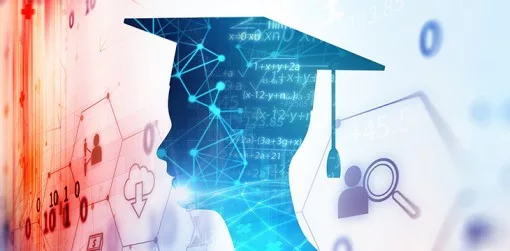Blockchain In Education – Find How It Impacts

As more people and companies become aware of how blockchain development technology may be used to unlock market opportunities, the blockchain revolution is continuously expanding in the industry. It is apparent how the economy is changing in numerous spheres and how various industries’ conventional operating methods are being updated. Popular applications of the technology include lot provenance and lineage, cross-border payments and settlements, and lot history.
Nowadays, a variety of industries, from the financial sector to manufacturing, banking, and finance, have already begun experimenting with this fastest-growing technology to benefit from its advantages in the long run. Even the education industry was no longer resisting the effects of blockchain.
Let’s quickly go through the definition of blockchain for those of you who are new to this site.
Let’s Understand – The Blockchain
If we were to succinctly define the phrase, we would say that Blockchain is a useful mechanism for storing data.
Blockchain is a publicly accessible, digitally distributed, encrypted ledger that is shared by many parties in a network. All network transactions are recorded, confirmed, saved, and broadcast to all users in a digital database. This ledger cannot be changed. It implies that the system cannot be altered, hacked, or conned.
Now that you have a foundational understanding of this rapidly evolving technology, let’s explore how blockchain benefits the education industry.
Is BlockChain Technology Ruling The Education Sector?
The traditional educational paradigm faces a number of challenges that limit its ability to develop and thrive. A new and enhanced era of learning has begun as a result of the use of blockchain-based software in the education sector. Which has quickly and effectively resolved significant problems with academic records, access to credentials, etc.
Beyond the traditional financial and cryptocurrency talking points, blockchain technology has brought about a significant transformation and introduced numerous alternatives. This area of study and knowledge transmission has always been proactive in implementing new technology to enhance the entire educational system. Education institutions will gain from using blockchain technology because it will improve security, reduce costs, and help institutions operate more efficiently.
But, it is also important to recognize that the use of this technology in education is only in its infancy.
According to a Gartner poll from 2019, only 2% of institutions of higher learning were using blockchain technology, while 18% still had plans to do so in the future.
According to the most recent statistics, blockchain integration in education has greatly increased globally.
The market for blockchain in education was estimated to be worth USD 118.73 million in 2021 and is anticipated to grow at a CAGR of 43.94%, reaching a new high of USD 1055.98 million by 2027.
Although technology in this industry still has a ways to go, the statistics indicate better progress.
How Blockchain is Transforming the Education Sector
Education industry is moving in a new direction because of blockchain. Blockchain education application development solutions are having a positive impact on the education industry. From replacing textbooks with technology to accelerating the record-keeping process.
Smart Contracts for Assignments & Courses
There is a good possibility that if you are familiar with blockchain, you have heard about smart contracts. A smart contract is a piece of computer code that automatically regulates, documents, or carries out the conditions of an agreement or contract.
Teachers can create a number of courses on a blockchain using smart contracts. Several terms and conditions will be included in such an agreement. Course will start automatically once all the prerequisites have been satisfied. The due date, the grading deadline, and other details will be spelled out in a smart contract between students and teachers.
Making Fee Payments More Simple
Paying student fees is a time-consuming and stressful affair. It involves a lot of other stakeholders, such as parents, kids, teachers, banks, and various university departments. A more effective solution is needed for this onerous process. Best option is blockchain since it improves how the fee payment procedure is streamlined.
Reduced Costs and Universal Access
One can anticipate the secure and cost-effective sharing of many educational resources, including books, podcasts, etc., thanks to blockchain technology. Blockchains are used for both course and exam registration for students.
Report Cards, Degrees, and other Paperwork
As blockchain is an immutable distributed ledger technology. This is something we are all familiar with, it can assist teachers in keeping track of student transcripts, report cards, attendance, and other events. Students can easily access assignments or other critical information thanks to blockchain technology in education. It will dispel the worry about replacing assignments.
Education Incentivization
Today’s market is abuzz with talk of cryptocurrency. What if it is included in the education industry? One of the most popular applications for blockchain is cryptocurrency and tokenization. Professors or other educators will likely start rewarding their pupils with cryptocurrencies in the near future to encourage them and help them succeed in a certain subject.
Future of Blockchain In Education!
Despite the fact that blockchain technology is developing, many institutions are still hesitant to give it a shot due to a few technical challenges like scalability and data protection. These restrictions are taken quite seriously these days. Nevertheless, if you keep investing in blockchain technology. You’ll be able to anticipate the next breakthrough, and in the coming years, blockchain technology will become a standard technology.










